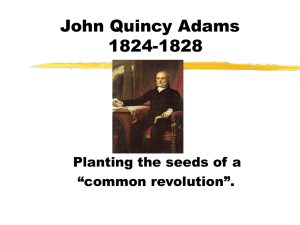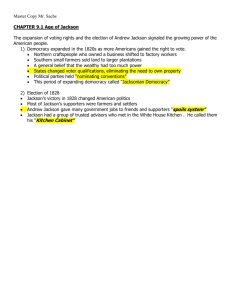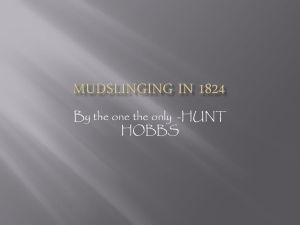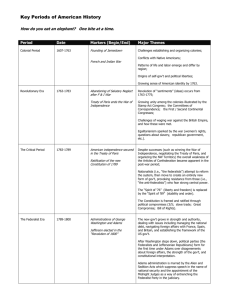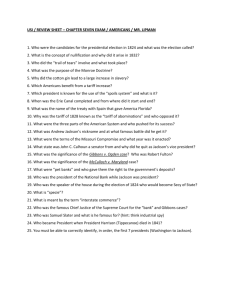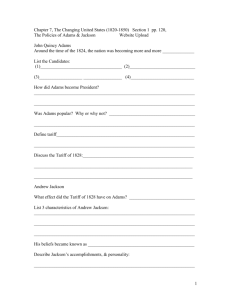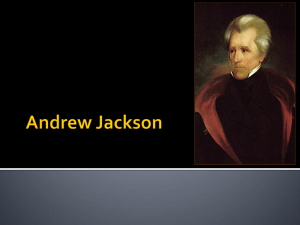CHAPTER 10 THE TRIUMPH OF WHITE MEN'S DEMOCRACY
advertisement
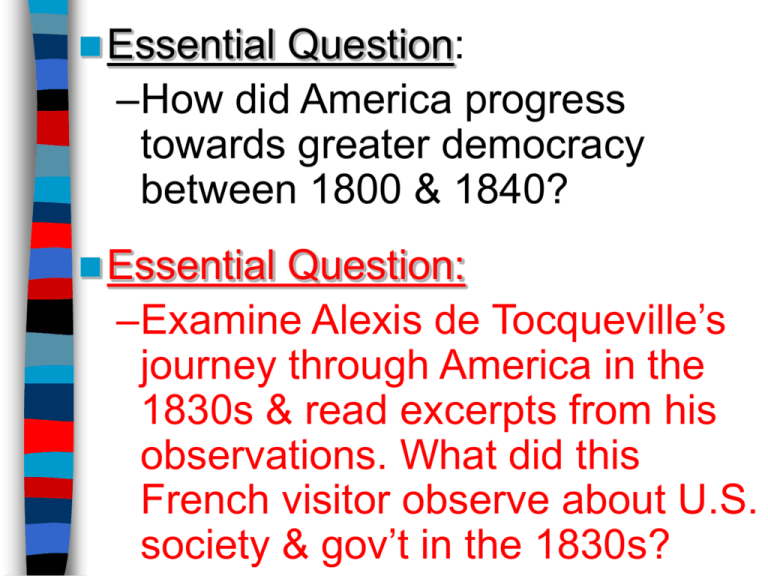
Essential Question: –How did America progress towards greater democracy between 1800 & 1840? Essential Question: –Examine Alexis de Tocqueville’s journey through America in the 1830s & read excerpts from his observations. What did this French visitor observe about U.S. society & gov’t in the 1830s? Alexis de Tocqueville The Growth of White Men's Democracy Growth of Democracy Less The than 50% of white men could vote From 1824 to 1840, democracy was extended to more Americans: This increase in “democracy” was a –Before 1800, most states limited major shift from the “virtuous republic” the right by to Jefferson vote exclusively to envisioned & Hamilton property owners & taxpayers –By 1840, these restrictions were removed for most white men –Nowhere else in the world was the90% right to vote as widespread of white men could vote as in the USA The of Democracy ThereGrowth was a growing % of White males were seen as equal Americans who owned no land Bybefore the 1830s, a in “democracy of the law & voting Rising industrialization led to a commoners” becameinmore Decreased requirements population of low-paid laborers the licensed professions accepted than a “republic of Division between commercial No clear domestic natural aristocrats” farmers & yeoman farmers servant class –Positions of power became attainable for “self-made” men –Americans valued equal opportunities among white men, but not necessarily equality Before 1800, most states limited the right to vote exclusively to property owners & taxpayers Quick Class Discussion: Why did this unprecedented growth in democracy occur? The Simple Answer: Westward expansion led to an increase in democracy Westward Jefferson’s expansion vision led “republicanism” to all increased suffrage did men not By 1840, more than of 90% of adult white forapply “common” in (“universal the West men because in white the “new there states” were who no could vote male suffrage”) “virtuous did not qualify elite” to in rule the “older for thestates” people As more western states extended democracy to “common men,” political parties in eastern statesoffelt But…this extension suffrage did not pressure to do the same include African-Americans or women Universal Manhood Suffrage Political parties developed new types of politicking in order to reach “new voters” –In the 1820s, politicians began using campaigns, parades, slogans to appeal to the masses –Well-organized, statewide “political machines” developed –Party loyalty became expected –Partisan newspapers boomed Universal Manhood Suffrage Partisan newspapers played an important role in early American Could “mob politics rule” really work in America? Universal Manhood Suffrage The 1830s & 1840s experienced: –Massive voter turnout due to the growth of suffrage & increased organization of political parties –Direct methods of selecting presidential electors, county officials, state judges, & governors (replaced indirect methods by state legislatures) What is voter turnout like today? Democratic Culture In the 1830s, high literacy & cheap printing allowed artists & writers to work for a “mass” audience: –Popular genres include romanticism, gothic horror, & landscape paintings –Authors included Wadsworth, Emerson, Melville, Hawthorne, Whitman, Poe; showed human nature, morality, romanticism Kindred Spirits, by Asher Durand Politics: The Elections of 1824 & 1828 John Quincy Adams video Sec The of State Secof of 1824 Treasury Election under Monroe under Monroe The election of 1824 was a 4-way race among Dem-Republicans: –John Quincy Adams represented New England –William Crawford represented the South –Henry Clay & Andrew Jackson represented the West Speaker of the Not taken seriously at first; Jackson votemade but butthe “warpopular hero” status House; author ofwon Jackson a nat’l candidate American not System a majority of electoral votes But, because no one candidate received 51% JQ Adams won NE Adams won when of the electoral votes, theLed House of Repsthat had to charges Henry threw toClay determine the Adams hadwinner "bought" Crawford won VAhis butpresidential support him few other behind Southern states the presidency (Corrupt Bargain!!) Clay’s influence was limited to a few western states Jackson did well in the South & the West J. Q. Adams' Administration Adams had a difficult presidency: Onewanted exception: –JQ Adams to continue the National Road the nationalist programs of the “Era of Good Feelings” –The depression of 1819 limited the nationalist agenda & few of Adams’ policies became law –A protective tariff was passed to help farmers & industry, but this angered the South Jackson Comes to Power “Jacksonians” prepared for the “Democrats” distinguished themselves election of 1828 by creating a as different from the “Nationalist Republicans” well-organized, national campaign who has strayed from the Jeffersonian ideal – Jackson (TN) formed a coalition But, these “Jacksonian Democrats” are not Adams’ VP Calhoun (SC), going towith mirror the “Jeffersonian Republicans” Van Buren (NY), & 2 newspaper editors (KY) to rival JQ Adams – Formed the basis of 1st modern political party, calling themselves the “Democrats” Jackson Comes to Power Democrats presented Democrats The election of 1828 changed Jackson as “Old Hickory,” painted Adams American politics: uneducated, a hero, a dueler as an out-of& a–man of the people touch aristocrat Showed the effectiveness of political parties in elections – It was the 1st election with overt mudslinging & propaganda – Exciting appeals to average the (public rallies & barbeques) “Ms.man Jackson is a bigamist” &Jackson “Ms. Adams is athe bastard” won election as a “common man of the people” Jackson’s & rowdy inauguration Who wild is Andrew Jackson? Jackson Comes to Power Jackson was a popular candidate but it was not clear what type of president Jackson would be: –Jackson’s supporters wanted states’ rights & limited gov’t –During the campaign, Jackson never clarified his stand on major issues: banks, tariffs, etc. –Only stood for Indian removal Conclusions In the 1820s & 1830s, America became more democratic: –Westward expansion facilitated the expansion of suffrage for common white men –Led to unprecedented voter participation by citizens –Allowed for a new breed of “common man” politicians to come to power Review Questions: –What did the term common man mean in the early 19th century? –In what ways were Presidents Washington, Adams, Jefferson, Madison, & Monroe different from the “common man”?

